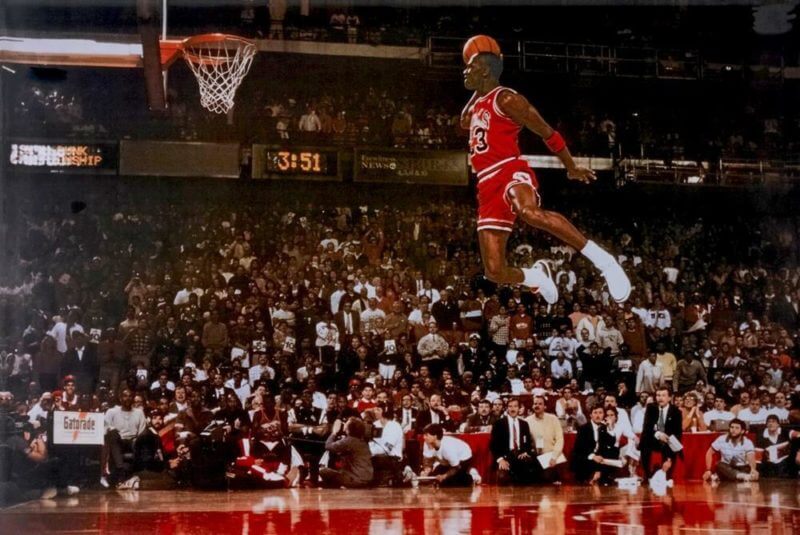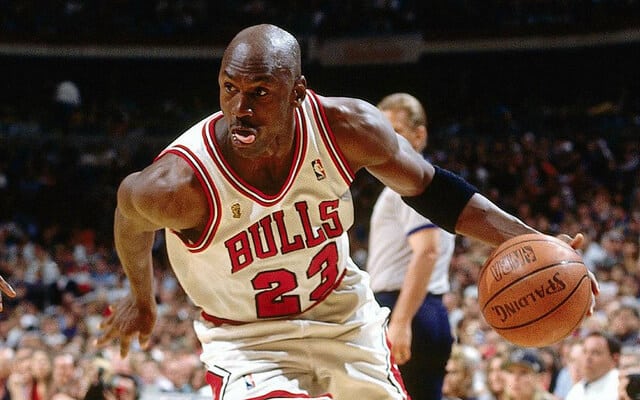
Michael Jordan and I have a lot in common. We both dominated the sport of basketball in our own way. He was the best player in the world, while I was the best player on my street in rural Wales, UK, where all the athletic kids played soccer or rugby. Like millions of fans around the globe I worshipped him from afar as my teenage years overlapped with the Chicago Bulls’ dynasty of the 1990s. It’s been a treat rekindling that childhood magic watching “The Last Dance”, the hit documentary chronicling Jordan and the Bulls’ pursuit of a sixth NBA championship. And not just because of the baggy clothes and 90s nostalgia.
My big break in sports came not on the court but behind the keyboard, as a co-founder of fantasy sports site FanDuel in 2009. Building a team of hundreds of people in a few short years taught me a lot about leadership in business, inspiring my new company, leadership training platform Hone. I therefore had the joy of watching “The Last Dance” through two lenses: one as a sports fan, one as a leadership educator, and below I draw out some of the leadership lessons on display.
Jordan’s unwavering pursuit of victory at all costs is as startling as it is strong, and at times crosses the line. But the great man up close oozes powerful principles that cannot be ignored. If leadership is defined as mobilizing a group of people to achieve a common goal, his effectiveness is indisputable. The following approaches can be used in business and life as much as sports, as we each lead ourselves and our teams to victory.
Focus on Winning
“My mentality was to go out and win at any cost. If you don’t want to live that regimented mentality, then you don’t need to be alongside of me.”
In every practice, in every game; in the face of adversity on and off the court; when surrounded by a maelstrom of media and front-office politics, Jordan never loses a simple, singular focus on winning. He is obsessed with it. It’s a razor for any decision (or person), and a personal insult if teammates don’t share that same fire. He cannot fathom how the team’s owners could contemplate losing games to gain a better draft position. They existed simply to win, driving a maniacal work ethic and pursuit of perfection. For us mere mortals, it’s easy to get side-tracked with distractions, pet projects, and drift away from our core objectives. Define what winning means for you and your organization and channel your inner MJ in its fanatical pursuit, repeatably and sustainably. It will simplify your life and ultimately bring you success.
Certainty
“I knew we were going to do it”
Jordan to Phil Jackson after the sixth title win.
His personal certainty was clear. When they lose to the Indiana Pacers in Game 3 of the Eastern Conference Finals, Jordan declares it “just bump in the road”. Uncertainty, especially in these unprecedented times, registers in the brain as an error to be corrected, according to neuroscience. Humans crave certainty, and leaders who provide it inspire teammates to follow. Get clear on your outcome, and provided it’s credible, project certainty to yourself and others that you will make it happen together. The certainty itself increases your chances.
Lead from the Front
“You ask all my teammates, the one thing about Michael Jordan was he never asked me to do something that he didn’t [expletive] do.”
How many of us can say that about ourselves as leaders? Jordan’s commitment was bottomless, practicing long hours against doctors orders, working out after games, taking the hard hits and the big shots. Can we ask our teammates for maximum commitment or to take on arduous tasks if we’re not doing that ourselves? Leading by example buys you respect and the latitude to push others to your level, a technique used by Jordan, harshly at times, to great effect. Our actions speak louder than our words. Whether it’s sprinting for a deadline, or modeling work-life balance by leaving the office early, step up and lead from the front. It’s one of the simplest and most powerful principles in leadership.
Inclusion
“When Scottie was out Dennis was a model citizen to the point it was driving him [expletive] insane. So, when Scottie came back Dennis wanted to take a vacation. I come to practice, Phil calls me in and says Dennis wants to tell you something. When Dennis wants to tell me something, I knew it’s not something that I didn’t [expletive] want to hear.”
Dennis Rodman was the wild child of the team. At times he would disappear without permission for days, partying in Las Vegas or making a surprise appearance at WWF events. Rather than ostracizing him, Jordan, Jackson and others understood “The Worm” was different, and that his unique talents needed to be managed in a special way. They gave him space to blow off steam; he felt understood, and repaid them with loyalty and performance. We’re all different and respond best to leaders who understand our individuality and tailor their management style accordingly. Consider the different personalities and needs in your team and adapt. Research shows that the #1 factor that sets great teams apart is creating a culture of psychological safety – a feeling that you can trust others enough to be yourself around them, and that they will have your back if you do.
Grit
“If you do the work, you get rewarded. There are no shortcuts in life.”
Researcher Angela Duckworth defines the personality trait grit as “perseverance and passion for long-term goals”, and found it was a better predictor of success than IQ. There are countless examples of grit from Jordan and those around him over the years. The definition could be their tagline. Overcoming their multiple, bruising losses to Detroit in ‘88, ‘89 and ‘90, then bulking up to finally overcome them on their way to the Championship after six years of trying. Training harder than ever in the offseason after their playoffs loss to Orlando, only to sweep them in the conference finals the next year. Jordan scoring 38 points while suffering from food poisoning in Game 5 of the 1997 Finals. Pippen playing with a back injury in Game 6 of the 1998 Finals. These feats show their mental and physical resilience to keep going no matter the adversity. An unwavering belief in ultimate victory (even if far in the future) paired with a commitment to doing whatever it takes to move forward right now, defines many successful leaders. What obstacles are in your way? Can you summon the strength to put one foot in front of the other and keep going? Success awaits eventually if you can.
Vision
“I just want the franchise and the Chicago Bulls to be respected as a team like the Lakers or the Philadelphia 76ers or the Boston Celtics. It’s very hard for something like that to happen. But it’s not impossible.”
In one of the more endearing clips, a young Jordan as he is drafted for the Bulls in 1984 aged just 21 years old lays out his hopes for what he and teammates can achieve in the coming years. For himself, he wishes to be considered amongst greats Larry Bird and Magic Johnson. The Bulls went on to eclipse these goals and kept stretching for more. Vision for your team needs to be aspirational and ambitious, yet clear and credible, and Jordan’s simple yet powerful vision fits the bill. While the structure of sports lends itself to such definitiveness, our role as leaders is to bring definition to the world so that others can clearly see where we are going.
Narrative
“I knew Jerry Krause loved Dan Majerle. Just because Krause liked him was enough for me. You think he’s a great defensive player? OK, fine. I’m going to show you that he’s not.”
There are several examples of Jordan using competitive narrative in his own head to motivate his aggression to beat the competition. Our brains bring order to the world through narrative, and the stories we tell ourselves shape how we feel, react and perform. They don’t even have to be true to work, as Jordan comically admits about the fake story he made up about LaBradford Smith sarcastically telling him “Good game, Mike” after a poor performance, to motivate him the next time they met. Recasting yourself in your own empowering narrative is a very effective way to unlock new levels of confidence and performance, regardless of your field.
Presence
“Why would I think about missing a shot I haven’t taken?”
Jordan is praised by Mark Vancil in the documentary: “His gift was not that he could jump high, run fast, shoot a basketball. His gift was that he was completely present, and that was the separator.” Jordan himself notes that particularly in his later years with the Bulls it was his mentality more than his physicality that fed his success. Being in the present moment instead of worrying about hypothetical consequences allowed Jordan to just play the game, to shoot the ball, even in clutch moments to win a championship in the final seconds. In everyday life being present can enhance happiness, build closer relationships and increase performance. Practicing meditation or mindfulness can bring us more presence, so if Jordan can do it in front of millions of spectators, we can do it too.
Jordan also exhibits traits that modern leaders should seek to avoid. Bullying teammates is just plain wrong, and selfishly can close down talents that can serve the ultimate goal by violating the principle of psychological safety. Scottie Pippen was the opposite as a leader in Jordan’s absence, creating a more egalitarian culture. Jordan also appears to hold grudges which can impair judgement: “Oh, I hated him. And that hate carries even to this day.”, he said of Isiah Thomas. He also famously fell out with Charles Barkley after a 20-plus year friendship over critical comments made about Jordan’s management of the Charlotte Hornets.
While nobody is perfect, Jordan’s prowess as a competitor and leader are undeniable. We don’t have to adopt all things from a teacher for them to serve us. His towering example of fierce competition, drive, grit, and vision inspired a generation and will do so down the ages.
There are many other lessons to be gleaned from this electrifying documentary, particularly on the team environment cultivated by Phil Jackson that we’ll examine in a future post. Meanwhile, you could do a lot worse than channel the best parts of Jordan’s leadership example to achieve the greatness that deep down you and and your team are capable of.








